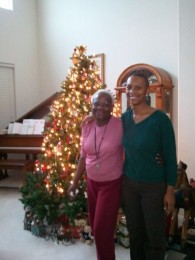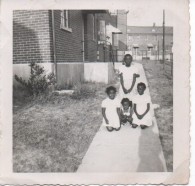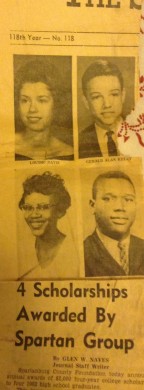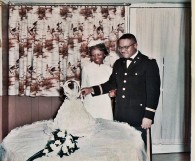
With My Mom, Ernestine Camp
One of my students wanted to do a speech about me because she said I inspired her. She asked me who had inspired me in life. My mom, Ernestine Camp, is the first person who came to mind. In the end, my student and I thought it better for her to do a speech about my mother because her story is incredible. My mom now has Alzheimer’s. It is hard on my son; it is hard on me; and of course it is hard on my mom. It’s a nightmare. So it’s nice and therapeutic to remember who my mom was (and still is somewhere in there). I hope you find her story as inspiring as I found it. Here is my mom’s story:
My mom was born in 1944 in a town in South Carolina. She was one of seven kids and very poor. Her father worked as a car mechanic and iron worker (when he could get work) and her mother worked as a maid for rich white people. Segregation laws were in effect during my mother’s childhood. She told me she remembers very clearly the first time she realized life would be unfair for her because of racism. She said she was three years old and walking home with her mother from her mom’s job. They walked by a park and my mom asked her mom to let her play in the park for awhile. Her mother told her she couldn’t play there because she was colored and it was a park for white kids only. (Can you imagine having to tell your child that?) My mother’s schools K-12 were all segregated. Also, the four-year-college that she went to was a historically black college (Benedict College in Columbia, South Carolina).

My Mom in South Carolina in the 1950s – She is the little girl seated far right.
My mom growing up was consistently the highest scoring student in her classes. Her parents had a troubled abusive marriage (Her dad cheated on her mom and her mom would hit her dad and he’d hit back). My mom was a very nervous kid from the time she was born and being in a home with so much unrest and violence made life difficult for her. Also, her family was so poor that often she’d spend her days hungry. Sometimes she even passed out at school because of hunger. When she learned how to read, she found a tool to escape her difficult life. She would go with her mom to some of her cleaning jobs and whenever she was in a home that had kids, my mom would go in the kids’ rooms and devour their books. She said reading the book Alice in Wonderland changed her life. It made her realize there was a whole other world out there. She knew the things in Alice in Wonderland weren’t real, but through that book, she learned that the imagination could create wonderful ideas. She started reading ferociously, as much as she could. At one point during her childhood, a colored library opened in her town (There had already been another library, but only white people were allowed.). When the library for black people opened up, she was in heaven. She would spend hours there (to avoid being in her house) and when she had to go home, she’d check out a book and take it home and read to her doll. She says she always wanted to be a teacher and so she would pretend she was teaching her doll. My mom especially loved Russian novels. She said at the library she would look for the biggest novels because she never wanted the books she was reading to end; she found Russian novels the longest and therefore the best in her mind.
At some point during her childhood, her mother had my mom and my mom’s sister start taking piano lessons. It’s hard to believe, isn’t it? They didn’t have enough food to eat, but my grandmother scrounged up enough money for piano lessons! My grandmother was not formally educated (no school after elementary school), but she was very particular about who she cleaned houses for. She wanted to raise her children to be formally educated, and so she made sure she only worked for rich, educated white people so she could mimic them. When she saw the daughters of the people she cleaned for took piano lessons, she decided her daughters would take piano lessons too. My mom loved her piano lessons. I guess it was another escape. She did really well because she practiced religiously. At one point my grandmother stopped paying the tuition for the lessons because she didn’t have the money. She’d tell my mother to tell her piano teacher she’d pay her the following week. After a few weeks of my mother telling her piano teacher the tuition would come the following week, the piano teacher told my mom not to worry about paying and that she would teach her for free! So my mom continued lessons. A few years later, during her teen years, my mom was able to make money by getting jobs playing piano in churches.
As I was saying, my mom always did well in school. When it was time for her to go to college, she got a full scholarship. Her city would award four scholarships each year to four top high school graduates (the top white female and male and the top black female and male). My mom was the top black female student the year she graduated. She said she had a hard time choosing between a major in math or a major in music. She knew she wanted to teach; she just wasn’t sure if she’d rather teach math or music. In the end she decided on math because it was something she could study in her dorm room and if she had majored in music, she’d have to leave her dorm room to practice piano. She wanted the option of just staying holed up in her room when she felt like it!

Here’s a newspaper clip from when my mom won her scholarship. She is in the lower left corner.
She did extremely well in college and she planned to start teaching soon after she graduated. But before she started teaching, she was contacted by one of her college math professors. He told her that President Lyndon B. Johnson (This must have been around 1966) was giving universities around the country money to educate students specifically in the fields of math and science. The country was worried about the Soviet Union back then and President Johnson wanted the US to beat the Soviet Union in science. So mom applied to one of President Johnson’s programs to get a master’s in math at LSU (Louisiana State University). My mom was selected (She was one of 4 people of color selected – in order for the schools to get funding for this program, they had to let people of color in). LSU was to be the first school that she would attend with white people.
My mom was terrified. She had always been at the top of her class, but since she had only gone to segregated schools, she didn’t know if her education would hold up at a white school. She didn’t know if she’d been given an inferior education. She knew that the books at her schools growing up were always the hand-me-down books from the white schools (Whenever a book came out with a new edition, the white school would get the new edition and the black school would get the old edition that the white school discarded). Her teachers had always been black, her classmates had always been black, and there was that stereotype that white people were more intelligent than black people hanging over her head. She also knew people could be hateful, so she was scared for her physical safety in a school that was accepting integration only because it was the law.
When she got to her dorm at LSU, she discovered she and one other black woman would be the only people in the dorm with their own bathrooms (because the school didn’t want to force the white students to share a bathroom with them). My mom peed in her bed her first night there, she was so nervous. She ended up moving out of the dorm after a few days because there was so much tension there. She said every time she’d walk into the lobby of the dormitory, everyone in the lobby would just stop their conversations and stare at her as she walked through. Through her sorority, she found an older black woman in a nearby neighborhood who was willing to rent her a room.
On the first day of class, my mom went to her first graduate school math class full of anxiety. When she walked in the classroom, everyone stopped and stared. The class was full of white men. As my mom walked to her seat she heard soft laughter. The professor introduced himself and then explained that the class was based solely on group work. He told the class that there would be no way to pass if they did not work in groups. She says she remembers the guys in the class looking at her and chuckling. She knew nobody was going to work with her, so she decided to enroll in another class. When she walked in the other class, after the professor introduced himself, he told the class that since they were graduate students, he expected them to be able to teach themselves. So everyday a student would be assigned a topic and that student would have to come to the next class prepared to deliver a lecture on that topic. Then he looked at my mother and told her she was getting the first topic. It was a Friday. She was to deliver the lecture on Monday.
My mom went home and opened her book so she could learn this topic. She says the only words she understood in that high level graduate school math book were the words, ‘and,’ ‘a,’ and ‘the.’ She started to cry. She cried and cried and cried. She felt so scared. She felt so much responsibility. She knew everybody in her hometown in South Carolina was counting on her to make it. She knew that if she failed, all those white men who laughed at her at LSU would think her failing was confirmation that white people were more intelligent. She felt the weight of the race on her shoulders. (By the way, the other black woman dropped out of the program right away. She found out she was pregnant and left to get married.) After her cry, my mother got out a pencil and paper and started copying the first page of the section from the book that she was supposed to lecture on. She just copied it over and over. She didn’t know what else to do. She had nobody that she could go to for help, so she just copied and copied the same page over and over until she fell asleep. When she woke up, she reread the page of the book and it still made no sense to her. So she just copied it again. By then she had that page memorized, so she went on to copy the next page over and over. She did that all day: copy a page over and over until she had it memorized and then go on to the next page. In between all this copying, she cried and cried. The next day when she woke up, she says she experienced what she would call a miracle (which means a lot because she had not been religious). When she woke up on Sunday and read the book, it made sense to her! She said at that moment, she realized there was something more powerful than she could possibly understand at work. She didn’t cry that day. She prepared her lecture and practiced teaching to the wall (since she no longer had her doll).
When she went into class that Monday, the professor asked if she was ready to deliver her lecture. She calmly and confidently responded, “Yes,” and she says she gave a wonderful lecture. Since she had practiced teaching to her dolls since she was a little girl, she was used to breaking down ideas so they would make sense to students. Her professor was impressed and told her so.
After that day, although most people still wouldn’t talk to my mom in that class, everybody in that class had respect for her. She said there was a group of four white guys who would often approach her before class to ask her if she’d figured out a problem that they hadn’t been able to figure out. Those guys would study together and they never invited her to study with them, but they would ask her if she got answers. She would always respond, “Yes, I got it,” as though it had been easy for her. They had no idea that it was never easy for her, but she wanted them to think it was so they would never believe that stereotype about white people having more intelligence than black people. She got some pleasure out of that. Also, the professor had the students seated alphabetically, so they couldn’t choose their seats. My mom sat next to this white woman who would completely ignore my mom. Whenever my mom would go to sit down, the white woman would move her chair a few inches away from my mom’s. Sometimes the professor would have students do homework problems on the board and he would just call on students in alphabetical order to go to the board. Whenever he called on the white woman whose seat was next to my mom’s, the white woman would say, “I’m sorry, professor, I didn’t get the answer.” My mom’s name would be called next and my mother would say, “Yes, I got it!” and she’d jump up and go to the board. She says she loved showing that woman up. My mom does remember one white woman in her class who was friendly toward her. The woman was a Catholic nun and while the woman didn’t speak much to her (She’d just say hello and goodbye), she would speak and during the holidays, she gave my mother a small gift. It was a fancy soap set that my mom never used because it meant so much to her. My mom says in the back of her mind she sometimes wondered if the woman gave her the soap set as a jab since black people were called dirty by racist white people, but she decided to assume the best and she appreciated the gift. The professors also ended up being kind to my mother. Well, she says they treated her with respect and she could tell the professor from the class where she had to do her lecture liked her.
When my mom took her final comprehensive exam for her master’s, she said she turned it in earlier than anyone in her class. As she turned it in, the professor asked, “Oh do you need to go to the restroom?” My mom answered, “No, I’ve completed the exam.” The professor then started to explain how she could find out her score and my mom interrupted him saying, “I know it’s an A.” Then the professor smiled and told her he looked forward to seeing her at graduation. She told him she had already put in a request to have her degree mailed to her because she wanted to get out of there as fast as she could! She did not stay for her graduation.
Soon after, my mom got married to my dad, had a son, and moved with my dad to California. He was in the army and was working at the Presidio in San Francisco. They loved California; they found it heavenly compared to the south (My dad had had his own harrowing experiences in South Carolina, including being permanently blinded in one eye by a group of n-word-shouting white men who attacked him as he walked to school). San Francisco in particular was wonderful as there were hippies and friendly people all over the streets of that city in the late sixties/early seventies. Later, my parents recognized the more subtle and hidden racism here (which actually made it scarier in many ways than the more overt racism in the south), but when they first arrived in California, they were so excited to be in a new environment.

My Mom and Dad
After my mom gave birth to her second child, she decided to pursue her dream of teaching. That’s how she ended up teaching math at Laney College. She taught here for over thirty years and was pregnant with me while teaching here! She wanted to have a daughter because she already had two sons, so she says someone in the math department baked her some pink cookies. She had her daughter and she used to tell people that she trained her replacement before she retired from Laney. When she retired, I already had a job and tenure at De Anza College. Then, because of her retirement from Laney (a few other instructors also retired at that time), a few jobs opened up in the math department here. I HAD to apply. Laney had always felt like my home. I applied and got the job. And guess what? My current office is my mother’s old office! I used her method of studying (writing stuff over and over and over and over until it made sense) when I was in grad school for math and I used the discipline that I learned in math to pursue a second career in musical theater. It really works! We’re more powerful than we understand!



